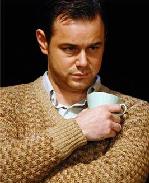SITE GUIDE
SEARCH
REVIEWS
REVIEW ARCHIVES
ADVERTISING AT CURTAINUP
FEATURES
NEWS
Etcetera and
Short Term Listings
LISTINGS
Broadway
Off-Broadway
NYC Restaurants
BOOKS and CDs
OTHER PLACES
Berkshires
London
California
New Jersey
DC
Philadelphia
Elsewhere
QUOTES
TKTS
PLAYWRIGHTS' ALBUMS
LETTERS TO EDITOR
FILM
LINKS
MISCELLANEOUS
Free Updates
Masthead
Writing for Us
A CurtainUp  London Review
London Review
 London Review
London ReviewThe Homecoming
|
Maybe it's not such a bad idea to have a woman in the house—Max
|

Danny Dyer as Joey
(Photo: Hugh Glendinning) |
Michael Attenborough's direction is unafraid to leave the characters' inhuman malevolence and unnaturalistic obtuseness unneutralised. The characters are simply despicable. Characteristic of Pinter, they reel off long diatribes of threats and intimidating anecdotes without any prompting. Ignored by their onstage audience, these monologues serve no other purpose than to add to the fraught atmosphere and to reveal these characters as thoroughly base creatures, unable to function with any sort of social empathy. At times, these caricature-style portraits are so extreme, they are comic. Without any other response open to them, the audience laugh at the inexplicability of the behaviour.
However, although this approach is faithful to Pinter's vision of stylised menace, it is difficult for the audience to engage with the characters. Lacking compassion, humane depth or even understandable motives for their viciousness, they often seem nothing other than mannequins of malice. Attenborough's decision to allow these characters to appear in all their ugliness is brave and provides a salutary glimpse into Pinter's dark world. Nevertheless, it can scarcely be called easy viewing.
Reflecting the unforgiving harshness of the interpretation, the set design is a grim 1960s dingy but expansive house. Dominated by grey and brown, the atmosphere is stale and very male, even if this masculinity is somewhat castrated and powerless).
The cast are near-flawless in their portraits of two-dimensional anti-heroes. In particular, Kenneth Cranham's foul-mouthed paterfamilias Max is an excellent study of a warped alpha male. Apart from a certain possessiveness, this father of three demonstrates no other paternalistic impulse. Also, with heavy East End vernacular, at times it almost seems like Cranham is executing a precise impression of Sir Alan Sugar.
Nigel Lindsay is the suave, articulate and intensely menacing Lenny and portrays a strange mixture of superficial charm with an undertone of absolute charmlessness. Danny Dyer is the taciturn, vain Joey with unfulfilled aspirations to be a boxer and Neil Dudgeon gives a first-rate performance as Teddy, the most civilised and successful son, who is also the only one with the sense to escape. Jenny Jules plays the only female part Ruth, originally created by the inimitable Vivien Merchant, with unflappable calm and control, who denudes the men of their power while seemingly submitting to their nefarious plans for her.
Although the cast are excellent and the direction is faithful to Pinter's perspective and atmosphere with exactitude, this play is really rather repellent and with too little emotional investment to be unsettling. Thick with heavy, oblique anger, there is an unredeemed vision of humanity which annihilates any sense of compassion. In fact, this is a faultless production of a deeply unpleasant play.
Editor's Note: A revival of this play currently running on Broadway, has met with very positive reviews, including from us. To read the Broadway Homecoming review go here
|
THE HOMECOMING
Written by Harold Pinter Directed by Michael Attenborough With: Kenneth Cranham, Nigel Lindsay, Anthony O'Donnell, Danny Dyer, Neil Dudgeon, Jenny Jules Design: Jonathan Fensom Lighting: Neil Austin Sound: John Leonard Running time: Two hours with one interval Box Office: 020 7359 4404 Booking to 22nd March 2008 Reviewed by Charlotte Loveridge based on 5th February 2008 performance at the Almeida Theatre, Almeida Street, N1 1TA (Tube: Angel) |
|
London Theatre Tickets Lion King Tickets Billy Elliot Tickets Mighty Boosh Tickets Mamma Mia Tickets We Will Rock You Tickets Theatre Tickets |




